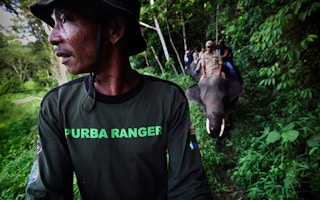On October 29, villagers here came upon an excavator tearing a gash through the Singkil Swamp Wildlife Reserve. The biodiversity hotspot is one of the archipelago country’s most important landscapes, situated as it is within the Leuser Ecosystem, one of the region’s last great swaths of intact rainforest.
The three workers found on the scene were hauled in by the authorities for questioning. By the looks of it, the men had been clearing the land in order to establish an oil palm plantation.
As of November 18, no suspect had yet been named — both in terms of the men who were arrested, and whoever must have hired them to do the job.
“What’s clear is that they weren’t opening the land to meet their daily needs,” said Genman Hasibuan, the head of the local branch of the Natural Resources Conservation Agency (BKSDA). “The presence of heavy machinery shows that the perpetrator wanted to enrich himself.”
The encroachment comes at a critical moment for the Leuser Ecosystem, which straddles the border between Indonesia’s westernmost Aceh and North Sumatra provinces. On Tuesday, a court in Jakarta will rule on a class-action lawsuit filed against the Aceh government’s land-use plan. The plan makes no mention of Leuser, leaving the nationally protected area vulnerable to exploitation by agribusiness and extractive industries.
Aceh’s unique geography means some 5 million people rely on Leuser for clean water. The ecosystem is also one of Asia’s largest carbon sinks as well as a world-renowned biodiversity hotspot, the only place on earth where orangutans, rhinos, tigers and elephants coexist in the wild.
Aceh’s politics are unique, too — to Leuser’s detriment, at least these days. The province enjoys “special territory” status and its government believes it can ignore the dictum from Jakarta that the entirety of Leuser remain a conservation area.
“
What’s clear is that they weren’t opening the land to meet their daily needs. The presence of heavy machinery shows that the perpetrator wanted to enrich himself.
Genman Hasibuan, head, Natural Resources Conservation Agency (BKSDA) Indonesia
It wasn’t always so. For decades, Aceh’s forests were largely untouched as rebels waged a separatist war. A peace agreement was finally signed in 2005.
Things changed after that. From 2006 to 2014, Leuser lost more than 102,000 hectares of forest cover, according to Global Forest Watch. Leuser spans more 2.6 million hectares in all, or 35 times the size of Singapore.
During the first half of this year, it lost a further 4,100 hectares, according to Forest, Nature and Environment of Aceh (HAkA), an NGO.
The deforestation is driven in large part by legally questionable, if not downright illegal, oil palm expansion that violates the ecosystem’s nationally protected status yet is nevertheless permitted by some local officials. Indonesia is the world’s top palm oil producer, yet the industry has fueled the country’s sky-high deforestation rate even as it drives economic growth.
Singkil is Aceh’s largest, deepest and most intact peatland. The fear is that it could go the way of the nearby Tripa peat swamp forest, which has been severely damaged by rogue plantation operators.
Singkil remains in much better shape than Tripa. But HAkA chairperson Farwiza Farhan told Mongabay there were already 1,000 hectares of illegal oil palm in the area.
Around 4,300 of Singkil’s 81,338 hectares have been damaged in pursuit of oil palm plantations, according to data from the Leuser Conservation Forum (FKL), an NGO.
The Orangutan Information Center, an NGO, has rescued three Sumatran orangutans (Pongo abelii) from the Singkil area this year, OIC director Panut Hadisiswoyo told Mongabay. All of the apes had been driven from their forest habitats by land clearing.
Rusli Anwar, a resident of Trumon subdistrict in South Aceh, said the encroachment in Singkil was the work of not only local people looking to make ends meet but cashed-up entrepreneurs too. “The biggest encroachment is done by local businessmen,” he told Mongabay-Indonesia. “Using heavy equipment, they have opened dozens of hectares of land to establish oil palm plantations.”
FKL manager Rudi Putra said the degradation of Singkil carried the potential for catastrophe. If it continued, he warned, “Trumon and parts of Aceh Singkil [district] will experience a disaster, and the people living around the peat swamp will become refugees. This would be a huge burden for the government.”
It wouldn’t be the province’s first deforestation-caused disaster. Flash floods in the denuded Aceh Tamiang district in 2006 were so devastating that they were termed a “second tsunami,” after the actual tsunami that struck Aceh in 2004. Tens of thousands of people were displaced.
“The law must be enforced so this doesn’t keep happening,” Putra told Mongabay-Indonesia.
Sabri, deputy chief of the South Aceh Police, assured community members during a meeting last week that he would see the latest case through to completion. Ipda Adrianus, head of the unit in charge of the case, told Mongabay-Indonesia that some witnesses had been called but the police were still investigating.
This story was published with permission from Mongabay.com. Read the full story.

















